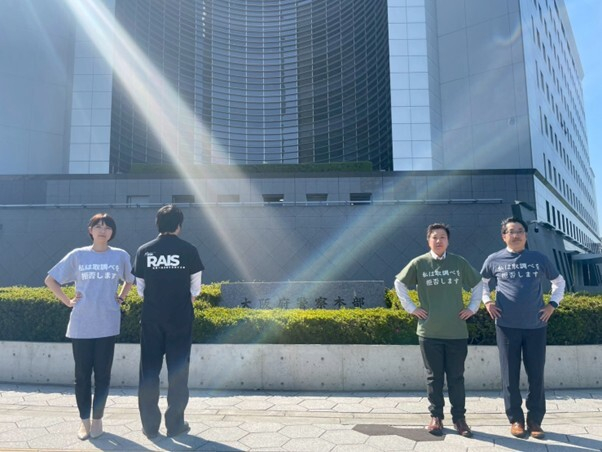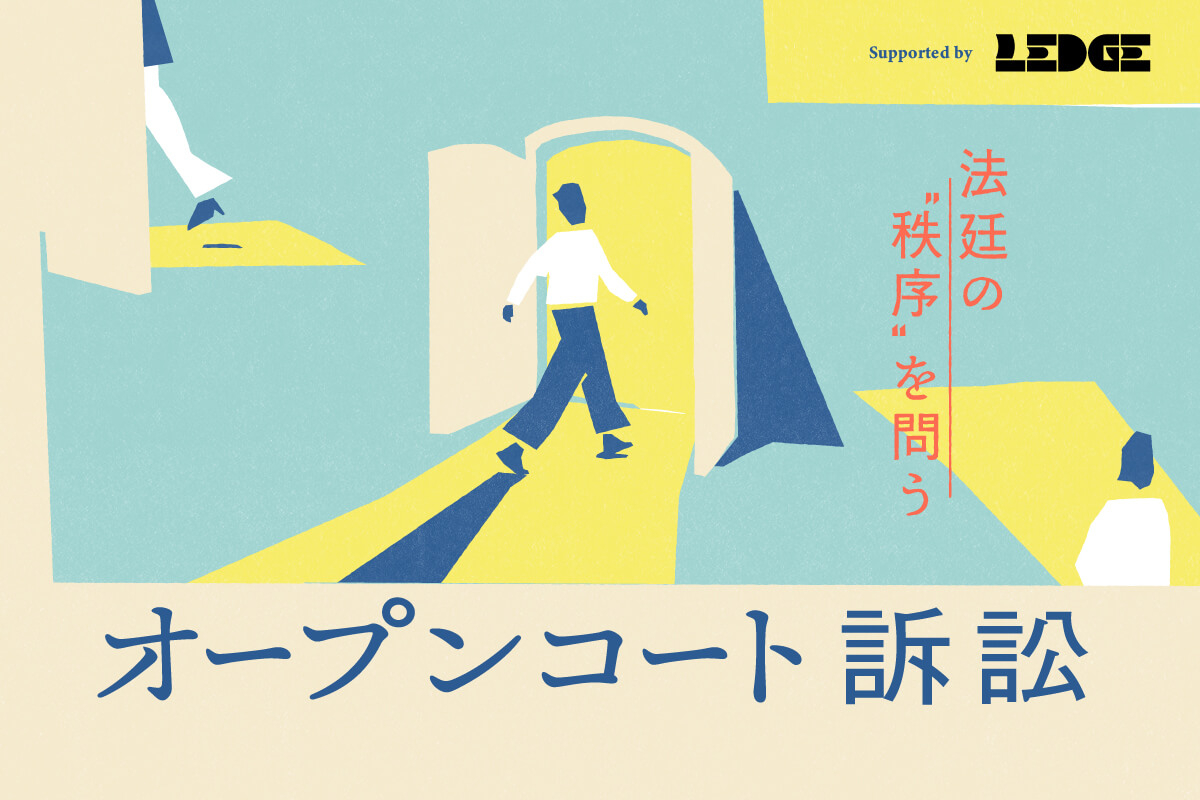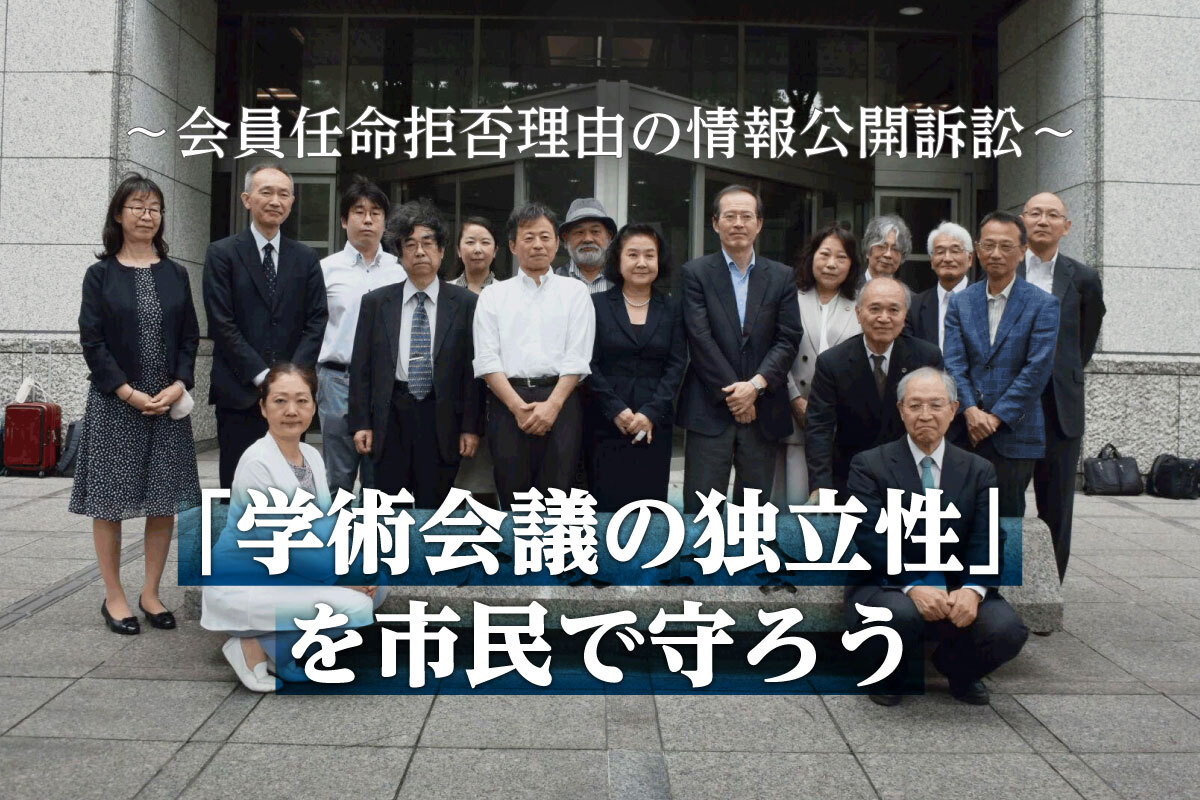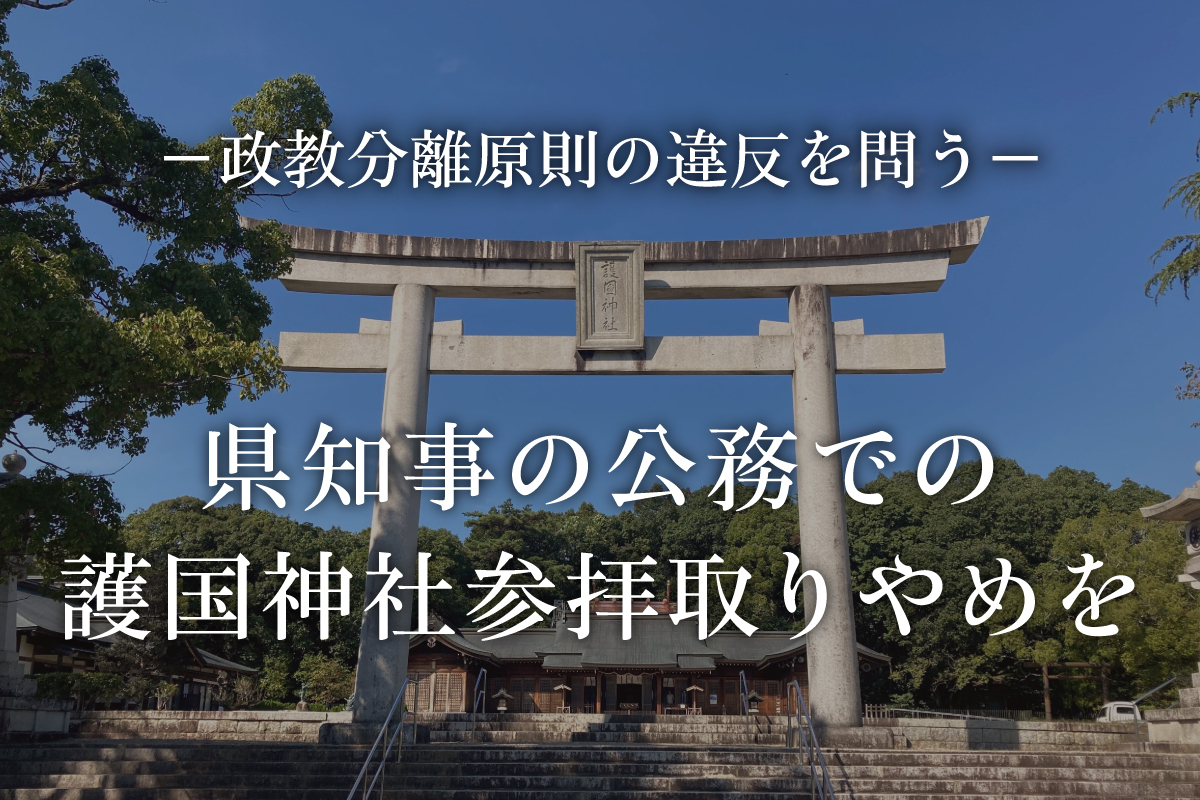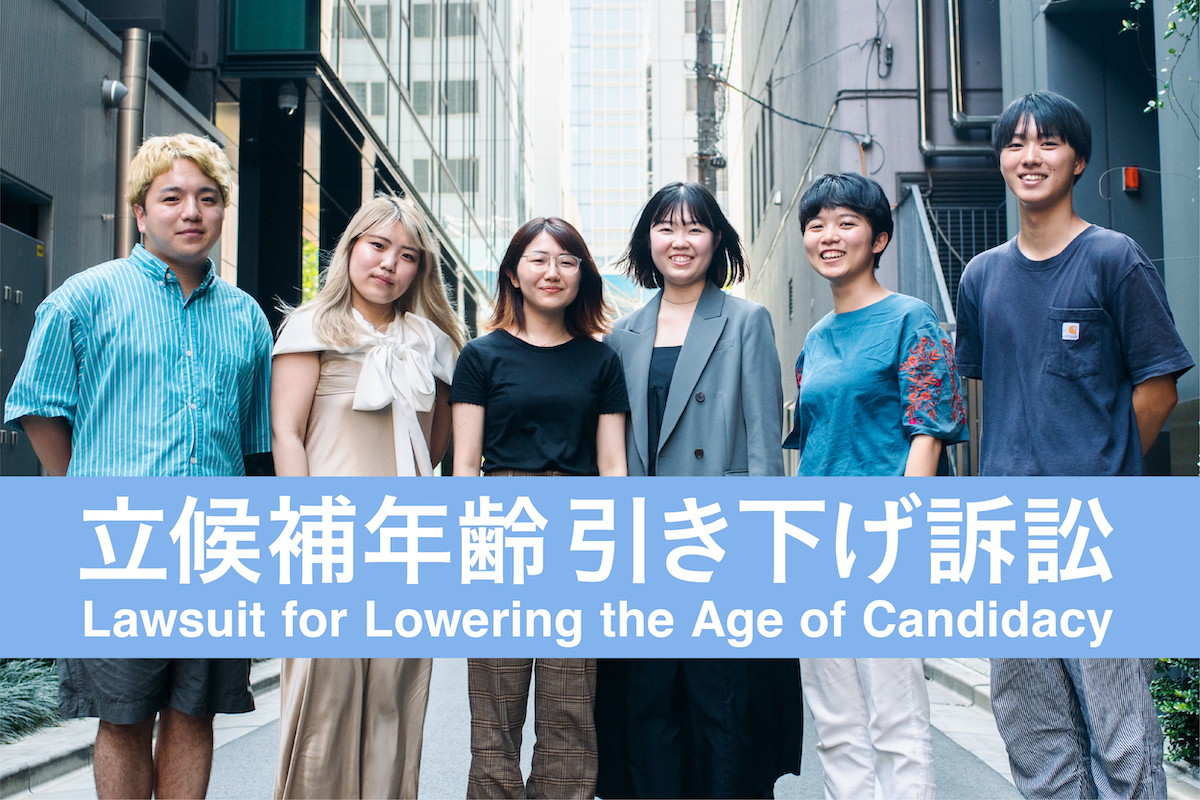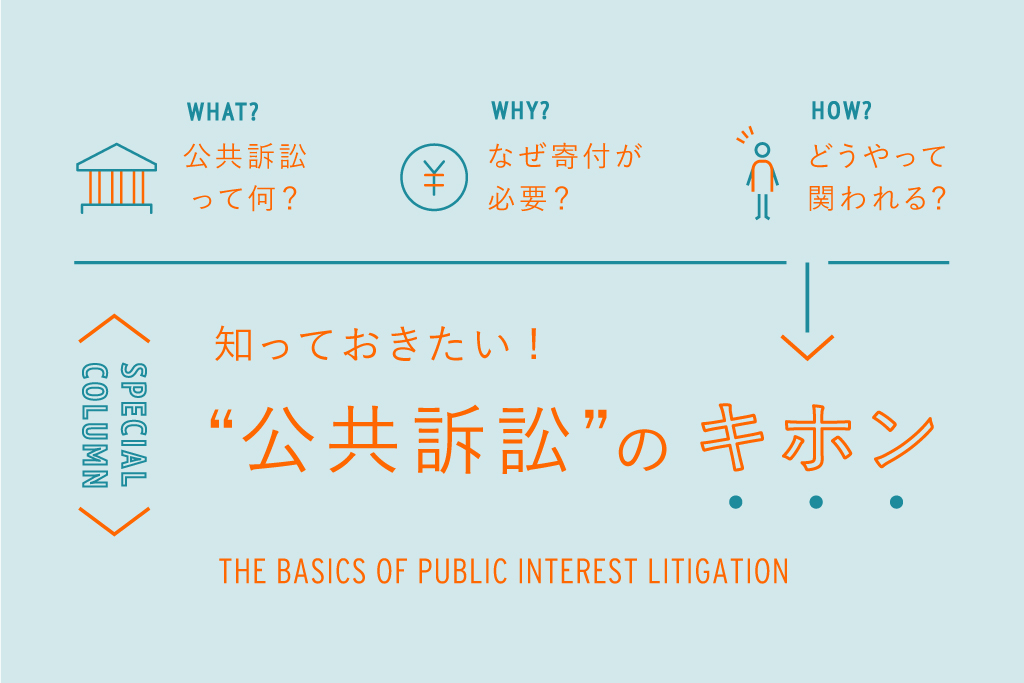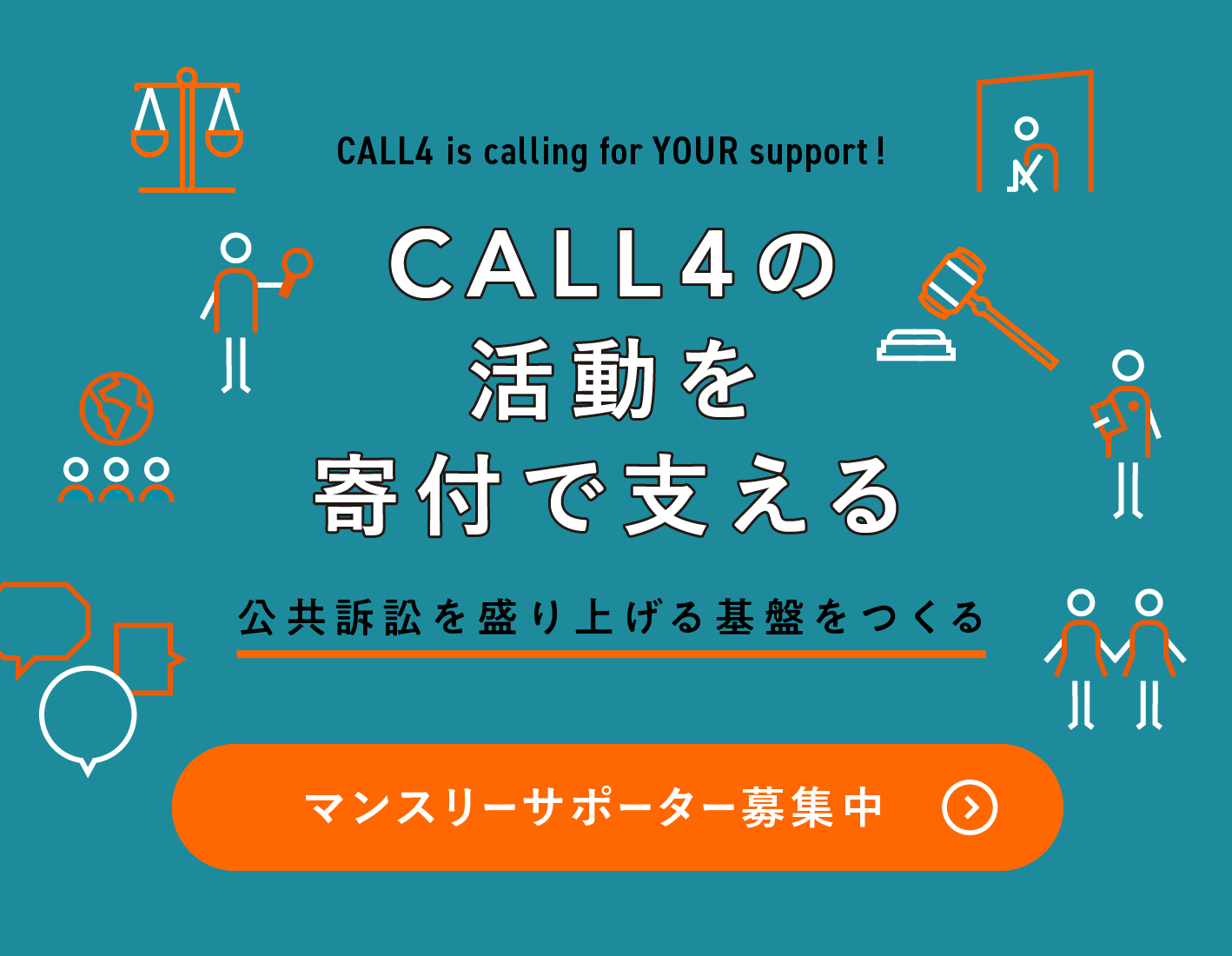「取調べ拒否」Tシャツを奪うな!―黙秘権と表現の自由を守る訴訟 Don’t Take Away My “I Refuse Interrogation” T-Shirt: Lawsuit for the Right to Remain Silent and Freedom of Expression
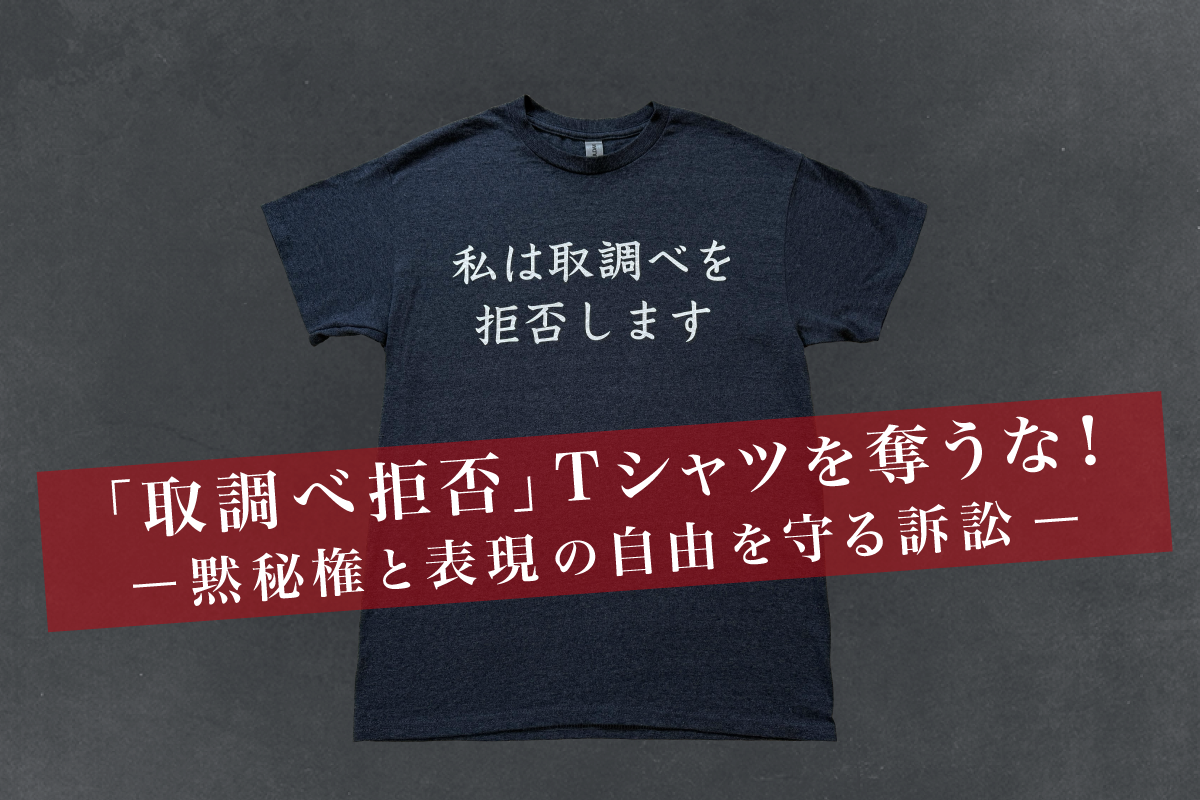
「私は取調べを拒否します」と書かれたTシャツがあります。このTシャツは、黙秘権を行使できるようにという思いで、弁護人がAさんに差し入れたものです。しかし、羽曳野警察署は、このTシャツを危険物として取り上げました。このような行為は、Aさんの表現行為の弾圧であり、また、Aさんの黙秘権を侵害し、弁護人の弁護活動を妨害するものです。私たちは、このTシャツを取り上げることの違憲性・違法性を明らかにします。 A T-shirt carries the message “I refuse to be interrogated” was confiscated as a dangerous item at the Habikino police station in Osaka. The T-shirt was given to A who was detained by the attorney to encourage the detainee to remain silent. The confiscation constrains freedom of expression, intrudes on the right to remain silent and interferes with lawyering activities. We seek to uncover the illegality and unconstitutionality of such police confiscation through this lawsuit.
はじめに
取調べの問題をご存知の方も多くいることと思います。日本では、逮捕・勾留中の最大23日間、長時間の取調べが連日なされます。そこでは、警察や検察が、自らの見立てに沿った供述を行うことを被疑者に強いてきます。取調べで黙秘しようとすると、長時間にわたり説得されます。その中で黙秘し続けることは非常に困難です。黙秘権を確実に行使するためには、そもそも取調べの場に行かないことが必要になります。
そこで、2024年に「取調べ拒否権を実現する会」が立ち上がりました。この会は「私は取調べを拒否します」と書かれたTシャツを作成しました。被疑者がこのTシャツを着て、取調べを拒否することで、黙秘権を確実に行使できるようにしようとしたのです。
ところが、羽曳野警察署は、弁護人が差し入れたこのTシャツを「危険物」として扱い、着ていたAさんから、このTシャツを取り上げました。その結果、Aさんは、精神的な支えを失い、取調べで黙秘を続けられず、供述してしまいました。
羽曳野警察署がTシャツを取り上げた行為は、取調べを拒否しようとするAさんの表現行為を弾圧するものであり、また、Aさんの黙秘権を侵害し、弁護人の弁護活動を妨害するものです。
事案の概要
Aさんは逮捕された後、羽曳野警察署で勾留されることになり、松本弁護士が弁護人に就いてからも、連日の取調べで警察官から供述を強要され続けました。黙秘を続けることは決して簡単なことではなく、Aさんは心が折れそうになりました。
そのような中、松本弁護士は、Aさんに「私は取調べを拒否します」と書かれたTシャツを差し入れました。このTシャツをAさんが着ることで、Aさんが取調べを拒否し、黙秘権を行使できるように、という思いからでした。Aさんも「松本弁護士がついていてくれる気がする。」と安心していました。AさんはTシャツを着て過ごしていました。
ところが翌朝、羽曳野警察留置管理課の職員は、「Tシャツはメッセージ性に問題がある」「危険物に当たる可能性がある」「脱ぐように」などと述べ、AさんにTシャツを脱ぐように指示しました。そして、羽曳野警察留置管理課の職員は、このTシャツを危険物保管庫の中に入れました。Aさんは、この日の取調べを拒否することができず、取調べで供述するよう説得され、黙秘を貫けずに供述してしまいました。
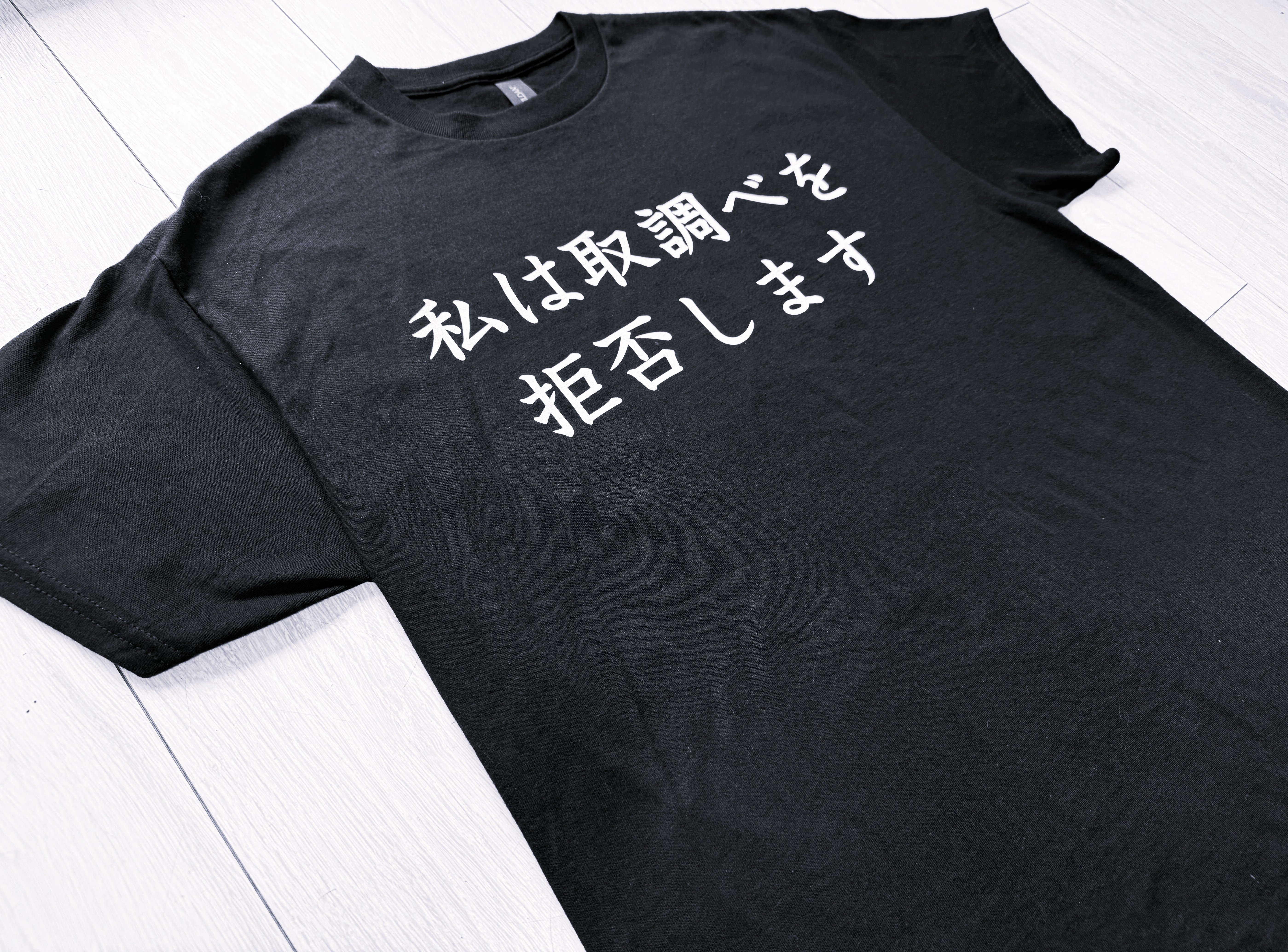
▲差し入れられたTシャツ
松本弁護士は、羽曳野警察署に対し、Tシャツの返還を求めました。しかし、羽曳野警察署は、大阪府警本部に確認中であると言ってきました。そこで、松本弁護士が大阪府警本部に対し、Tシャツの着用を認めるように求めました。すると大阪府警本部は、Tシャツについて、一律着用を認めない決定をしたと回答しました。
裁判の争点
私たちは、「私は取調べを拒否します」と書かれたTシャツの着用を認めないことは、主に次の権利を侵害すると主張しています。
① 表現の自由(憲法21条1項)の侵害
AさんがTシャツの着用及び保管が認められなかったのは、Tシャツに印字されている「私は取調べを拒否します」との文言に「メッセージ性」があり、その文言が「留置施設の規律及び秩序の維持その他管理運営上支障を生ずるおそれ」(被収容者処遇法187条)があると判断されたからです。つまり、メッセージの書かれたTシャツを持っていることも、取調べ中に着ることも、警察署の秩序の維持などを乱すというのです。これは、「取調べを拒否します」との内容に着目した表現行為の規制であり、まさに憲法21条1項が特に保障しようとしている表現内容を規制するものです。
第二十一条
集会、結社及び言論、出版その他一切の表現の自由は、これを保障する。
自分の意見や考えを他者に伝える表現の自由は、人権の中でも特に重要な権利です。過去に戦争に反対する声を政府の力で消し、国民を戦争に導いた歴史への反省から、憲法は特に人権の中でも表現の自由に対する侵害を厳しく制限しています。警察が一般市民の表現の自由を侵害することは、大変危険なことで、容易には認めてはなりません。
②黙秘権(憲法38条1項)の侵害
「被疑者」と聞くと「悪いことをした人」とイメージしてしまう人も多くいると思います。けれども、逮捕、勾留されただけで裁判もまだ行われていない段階では、本当に罪を犯したとは決まっていません。痴漢冤罪事件や袴田事件のように間違って逮捕されることもあります。
黙秘権が守られなければ、連日続く取調べで、捜査機関が被疑者を精神的に追い込んだり、マインドコントロールをして自白を得ようとする危険もあります。黙秘権がないと、取調べに応じなければならなくなり、捜査機関も自白を得るために拷問にまで及んでしまう危険があります。そのため、黙秘権は被疑者自身を守る大変重要な権利となります。
第三十八条
何人も、自己に不利益な供述を強要されない。
Aさんは、もともとの性格や留置場での生活により精神的に追い詰められていました。その状況で、取調官に対して自ら言葉を発して黙秘権行使の意思表示を行うことは容易ではありませんでした。Aさんにとっては、このTシャツを着用することこそが、黙秘権行使の意思(取調べを拒否する意思)を示す方法として適切で必要な方法だったのです。
しかし、警察の職員は、Tシャツを取り上げ、Aさんは、Tシャツを着ることにより黙秘権行使の意思表示をすることができなくなり、黙秘をすることができなくなってしまいました。これは、明らかにAさんの黙秘権の侵害です。
③弁護権(憲法34条1項)侵害
被疑者には憲法により弁護人依頼権が保障されています。この弁護人依頼権には、弁護人の援助を受ける権利も含まれます。このことから当然に、弁護人には、自分の依頼者に対し、弁護方針について援助を行う権利(弁護権)があるとされています。この弁護権には、捜査機関から妨害されずに弁護活動を遂行する権利も含んでいます。
第三十四条
何人も、理由を直ちに告げられ、且つ、直ちに弁護人に依頼する権利を与へられなければ、抑留又は拘禁されない。又、何人も、正当な理由がなければ、拘禁されず、要求があれば、その理由は、直ちに本人及びその弁護人の出席する公開の法廷で示されなければならない。
弁護人である松本弁護士は、Aさんとの留置所での面会で、Aさんに対して、黙秘権があること、黙秘権を使うことをアドバイスしました。そして、その黙秘権行使の意思表示の方法として、Tシャツを着ることをアドバイスして、Tシャツを差し入れました。松本弁護士のアドバイスと差入れは、Aさんが警察官の取調べから自分の権利を守るための援助であり、松本弁護士が自らの弁護権を行使したものでした。
警察が、AさんのTシャツを取り上げ、着させないことは、松本弁護士の弁護権も侵害しています。
原告の思い
原告 Aさん
ニュース等で「被疑者は黙秘しています」という報道を見聞きしたとき、どうして正直に話さないのかと不思議に思っていました。しかし、実際に私自身が逮捕されて取調べを受ける立場になってその意味がわかりました。
取調べでは、刑事からいろんな質問が次から次へと投げかけられ、何が事実だったのか自分でも段々わからなくなってきました。そんなとき、松本弁護士が接見に来て、「黙秘」をするようアドバイスをしてくれました。
しかし、刑事に黙秘すると言うと、態度が一変して黙秘することが「悪」のように扱われました。そのような状況で、恐怖と不安から、黙秘が難しいこともありました。
私のそんな表情を見て、松本弁護士は、「私は取調べを拒否します」と書かれたTシャツを差し入れて、「これ着て一緒に乗り越えましょう」と言ってくれました。
取調べに弁護人は同席できません。いつも孤独で不安でした。だからこそ、このTシャツを着ると、弁護人と一緒にいるような心強い気持ちになり、黙秘をすることができるような気がしました。私は留置場に戻るとすぐにそのTシャツを着て眠りにつきました。
しかし、翌朝、Tシャツの上からジャージタイプの上着を着ていたのですが、突然、「メッセージ性がある」、「危険物にあたる可能性」があるため脱ぐように、と言われ、Tシャツはどこかに持っていかれてしまいました。
取調室で、沈黙しつづけることは、本当に厳しいんです。なので、取調官に「私は取調べを拒否します」と胸に書かれた文字を見せ続けたり、弁護人と一緒に頑張っている気持ちでいることは、黙秘をするためにとても重要でした。Tシャツを取り上げられたことは非常に残念です。あのTシャツを着て取調室に行けるとだいぶ楽だと思います。
取調べで黙秘を貫けなかったこともあり、後悔しています。今回の訴訟によって、黙秘という大切な権利が行使しやすい社会になってほしいと思います。皆さま、応援のほどよろしくお願いいたします。
原告 松本亜土さん(弁護士)
逮捕勾留は、突然訪れます。
初めて逮捕・勾留された人は、混乱や不安な状況下で、プロの取調官による質問責めに対し、黙秘をすることは非常に難しいです。
特に初めての逮捕・勾留のときには、不安や動揺で、真実を思い出すことも困難です。
はっきりとした記憶がない場合に供述をすると、取調官はプロなので、捜査機関のストーリーに沿った供述調書が作成されてしまいます。
そのため、弁護人として、原則、取調べ室に行かないこと(出房拒否)や黙秘を勧めています。
しかし、日本の捜査実務では、黙秘しますと言ったところで、取調官からの継続した質問責めや、圧力から黙秘を貫くことは困難であり、黙秘権が実質的に保障されていないに等しい現状があります。
日本では被疑者の取調べに際して、弁護人の立会いも認められていないので、被疑者はたった一人で警察や検察と対峙しなければなりません。心が何度も折れそうになると思います。
そこで、私はAさんに「私は取調べを拒否します」と書かれたTシャツを差し入れ、このTシャツを着て黙秘するよう助言しました。
弁護人の私が差し入れた、被疑者の防御権にとって必要なTシャツを一切着用させなかったという行為は、弁護人が依頼人の権利を弁護するという弁護権の侵害にもあたります。
日本では、弁護権侵害に対する責任追及は、ほとんどありません。弁護権が適切に保障されなければ、依頼者の利益を守ることは困難です。そこで、今後弁護権がより確たるものとなるために、私も原告として提訴することにしました。
今後、弁護権が適切に行使できるよう応援のほど宜しくお願い致します。

社会的意義
本来、権力を行使する側は、憲法や法律を遵守し、私人への規制は憲法や法律に従った必要最小限のものでなければなりません。特に、本件のような憲法上の権利に対する規制が伴う場合には、特に慎重な判断を要します。
「私は取調べを拒否します」と書かれたTシャツは、これまでにも大阪府警察本部が管轄する留置施設内で着用されていましたが、なんらの問題も発生していませんでした。Aさんは極めて静かに、しかし、明確に、自己の防御方針を取調官に示すために、Tシャツを着用していたに過ぎません。
しかし大阪府羽曳野警察署の職員は、このTシャツを留置施設内で着用することが規律及び秩序を害するという意味で危険物にあたるとして、AさんからTシャツを取り上げました。
その後、大阪府警察本部は、このTシャツは一律着用させないと決定しました。
大阪府警察本部は、自分たちに都合の悪い文言を排除・規制したのです。これは、Aさん、ひいては警察署に留置されている全ての人々の表現行為に対する弾圧であり、また、黙秘権を含む防御権を侵害するものです。
この訴訟を通じて、警察権力の暴走に歯止めをかけ、さらには全国の警察署に留置されている方々に対する過剰規制を少しでもなくせるようにしたいと思っています。
資金の使途
・憲法学者や刑事訴訟法学者への意見書費用
・弁護団活動費(本ケースの周知・啓発行事)
・訴訟事務費用(印紙代、郵便費用、印刷費等)
・弁護士費用
・原告交通費
・その他リサーチ費用
担当弁護士のメッセージ
「取調べを拒否します」というTシャツは、誰にも迷惑をかけずに、防御方針を伝える手段です。
Aさんが着ていたTシャツは、それ自体には何らの危険性はありませんでした。それにもかかわらず、胸に刻まれた文字が警察にとって好ましくないという理由で奪われました。警察によるこのような行為は、着たい服を着る自由を侵害するだけでなく、表現の自由や黙秘権、弁護人の援助を受ける自由、自己防御権を侵害する違法行為です。
原告Aさん、原告松本亜土弁護士だけの問題ではなく、刑事司法全体の問題です。このような警察の過剰規制を許してはならないと考え、本訴訟を提起しました。
担当弁護士のご紹介
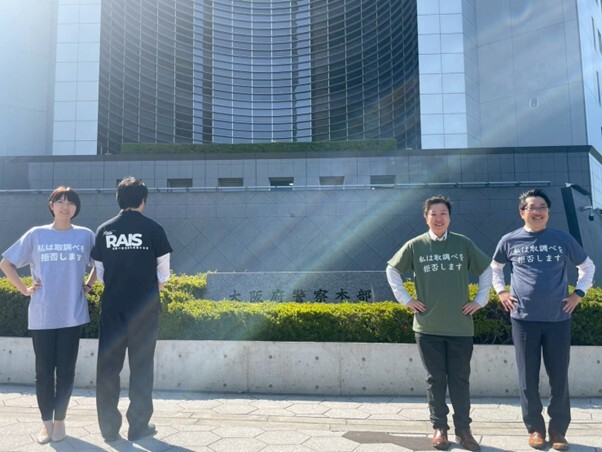
原告ら訴訟代理人
高山 巌 ゼラス法律事務所
川﨑 真陽 星田かささぎ法律事務所
千々和 章 藪野・藤田・千々和法律事務所
津金 貴康 Kollectプラス法律事務所
湯浅 彩香 法律事務所結
原告A訴訟代理人
松本 亜士 関西合同法律事務所
おわりに
どうか、この事件を他人事だと思わないでください。罪を犯していない人でも、警察から疑われるだけで、誰もが取調べを受ける可能性があります。
このページをみてくださっているあなたが取調べを受けるとき(罪を犯していなくても)、弁護士と相談した結果、黙秘権を行使することが防御のために必要であるという結論に至ることもあるでしょう。
誰もが適切に憲法で保障された正当な権利を行使できるよう、最後まで、弁護団全員で力を合わせていきます。
この訴訟は、問題点が専門的かつ多岐にわたるため、どうしても専門家の意見書費用も多額になる見込みです。どうか、ご支援の程よろしくお願いします。
*Translated by google translate
Introduction
I'm sure many of you are aware of the problems with interrogations. In Japan, suspects undergo long interrogations every day for up to 23 days during their arrest and detention. During these interrogations, the police and prosecutors try to force suspects to make statements that fit their own views. If you try to remain silent during an interrogation, you will be persuaded for a long time. It is very difficult to remain silent under such circumstances. In order to ensure that you exercise your right to remain silent, it is necessary not to go to the interrogation in the first place.
So in 2024, the "Association for the Realization of the Right to Refuse Interrogation" was launched. This group created a T-shirt that read, "I refuse to be interrogated." The idea was that suspects could wear this T-shirt and refuse to be interrogated, ensuring that they could exercise their right to remain silent.
However, the Habikino Police Station treated the T-shirt provided by the defense attorney as a "hazardous item" and confiscated it from Mr. A, who was wearing it. As a result, Mr. A lost his emotional support, was unable to remain silent during questioning, and made a statement.
The Habikino Police Station's action of confiscating Mr. A's T-shirt is an attempt to suppress Mr. A's expressive act of refusing to be questioned, a violation of Mr. A's right to remain silent, and an obstruction to his defense lawyer's activities.
Overview of the case
After Mr. A was arrested, he was detained at Habikino Police Station, and even after Attorney Matsumoto was appointed as his defense lawyer, he continued to be forced to make statements by the police during daily interrogations. It is not easy to remain silent, and Mr. A was close to breaking down.
In the midst of all this, Attorney Matsumoto gave Mr. A a T-shirt with the words "I refuse to be interrogated" written on it. The reason for this was that by Mr. A wearing this T-shirt, he would be able to refuse interrogation and exercise his right to remain silent. Mr. A also felt relieved, saying, "I feel like Attorney Matsumoto is with me." Mr. A spent his time wearing the T-shirt.
However, the next morning, a staff member from the Habikino Police Detention Management Division instructed Mr. A to take off his T-shirt, saying, "The message on the T-shirt is questionable," "It could be considered a dangerous item," and "Take it off." The staff member from the Habikino Police Detention Management Division then put the T-shirt in a dangerous items storage facility. Mr. A was unable to refuse questioning that day, and was persuaded to make a statement during questioning, and he made a statement without being able to maintain his silence.

▲ The T-shirt that was given to me
Attorney Matsumoto asked Habikino Police Station to return the T-shirt. However, Habikino Police Station said that they were checking with the Osaka Prefectural Police Headquarters. Attorney Matsumoto then asked the Osaka Prefectural Police Headquarters to allow the T-shirt to be worn. The Osaka Prefectural Police Headquarters responded that they had made a blanket decision not to allow the T-shirt to be worn.
Issues at issue
We argue that refusing to allow people to wear T-shirts that say "I refuse to be interrogated" primarily violates the following rights:
1) Violation of freedom of expression (Article 21, Paragraph 1 of the Constitution)
Mr. A was not allowed to wear or keep the T-shirt because the words "I refuse to be interrogated" printed on it were deemed to be "message-like" and "likely to cause problems in the maintenance of discipline and order in the detention facility and in other aspects of its management and administration" (Article 187 of the Detainee Treatment Act). In other words, possessing a T-shirt with a message on it and wearing it during interrogation disrupts the maintenance of order in the police station. This is a restriction on expressive behavior that focuses on the words "I refuse to be interrogated," and it is exactly the restriction on the content of expression that Article 21, Paragraph 1 of the Constitution is specifically intended to guarantee.
Article 21
Freedom of assembly, association, speech, press, and all other freedoms of expression are guaranteed.
Freedom of expression, the right to convey one's opinions and thoughts to others, is one of the most important human rights. Reflecting on the history of the government using its power to silence voices opposed to war and leading the nation into war, the Constitution places strict restrictions on infringement of freedom of expression, among other human rights. It is extremely dangerous for the police to infringe on the freedom of expression of ordinary citizens, and should not be easily accepted.
2) Violation of the right to remain silent (Article 38, Paragraph 1 of the Constitution)
When you hear the word "suspect," many people may imagine "someone who has done something bad." However, at the stage where a person has only been arrested and detained and no trial has yet taken place, it has not been determined that they have actually committed a crime. There are also cases where people are mistakenly arrested, such as in the case of the false molestation accusation and the Hakamada case.
If the right to remain silent is not respected, there is a danger that the investigative authorities will try to mentally pressure the suspect or use mind control to obtain a confession during interrogations that continue day after day. Without the right to remain silent, the suspect will have to cooperate with the interrogation, and there is a danger that the investigative authorities may resort to torture to obtain a confession. Therefore, the right to remain silent is a very important right that protects the suspect himself.
Article 38
No one shall be compelled to make testimony incriminating against himself.
Mr. A was mentally cornered due to his personality and life in the detention center. In that situation, it was not easy for him to express his intention to exercise his right to remain silent by speaking up to the interrogator. For Mr. A, wearing this T-shirt was the appropriate and necessary way to show his intention to exercise his right to remain silent (his intention to refuse interrogation).
However, the police officer took away the T-shirt, and by wearing the T-shirt, Mr. A was no longer able to express his intention to exercise his right to remain silent. This is clearly a violation of Mr. A's right to remain silent.
3) Violation of the right to counsel (Article 34, Paragraph 1 of the Constitution)
Suspects are guaranteed the right to request a defense attorney by the Constitution. This right to request a defense attorney includes the right to receive assistance from a defense attorney. Naturally, defense attorneys are considered to have the right to provide assistance to their clients regarding their defense strategy (right to defense). This right to defense also includes the right to carry out defense activities without interference from investigative authorities.
Article 34
No person shall be arrested or detained without being at once informed of the charges against him and without the immediate right of counsel; nor shall he be detained without sufficient cause, which upon demand shall be immediately shown in open court in his presence and that of his counsel.
Attorney Matsumoto, who is the defense lawyer, met with Mr. A in the detention center and advised him that he had the right to remain silent and that he should use that right. He also advised him to wear a T-shirt as a way to demonstrate his intention to exercise that right, and provided him with a T-shirt. Attorney Matsumoto's advice and provision of the T-shirt was to help Mr. A protect his rights during questioning by the police officers, and Attorney Matsumoto was exercising his right to defense.
The police's confiscating Mr. A's T-shirt and refusing to allow him to wear it also violated Attorney Matsumoto's right to defense.
Plaintiff’s thoughts
Plaintiff A
When I saw or heard on the news that "suspects are remaining silent," I wondered why they wouldn't tell the truth. However, when I was actually arrested and interrogated, I understood what it meant.
During the interrogation, the detective asked me various questions one after another, and I gradually began to lose track of what the truth was. At that time, Attorney Matsumoto came to see me and advised me to remain silent.
However, when I told the detectives that I would remain silent, their attitude changed completely and I was treated as if my silence was a "bad thing." In such a situation, due to fear and anxiety, it was sometimes difficult to remain silent.
Seeing the expression on my face, Attorney Matsumoto handed me a T-shirt that said "I refuse to be interrogated" and said, "Wear this and let's get through this together."
My lawyer couldn't be present during the interrogation. I was always lonely and anxious. That's why when I wore this T-shirt, I felt reassured, as if my lawyer was with me, and I felt like I could remain silent. As soon as I returned to the detention center, I put on the T-shirt and went to sleep.
However, the next morning, when I was wearing a tracksuit-type jacket over my T-shirt, I was suddenly told to take it off because it "contains a message" and "may be considered a dangerous item," and my T-shirt was taken away somewhere.
It's really tough to remain silent in an interrogation room. So, showing the interrogator the words "I refuse to be interrogated" written on my chest and feeling that I was working hard with my lawyer were very important to me in order to remain silent. I'm very sorry that my T-shirt was taken away. I think it would be much easier if I could go to the interrogation room wearing that T-shirt.
I regret that I was not able to remain silent during questioning. I hope that this lawsuit will lead to a society in which it is easier to exercise the important right to remain silent. I would appreciate your support.
Plaintiff Ado Matsumoto (Lawyer)
Arrest and detention can come suddenly.
For people who have been arrested and detained for the first time, it is extremely difficult to remain silent while being bombarded with questions by professional interrogators in a confusing and anxious situation.
Especially when you are arrested or detained for the first time, you may feel anxious and upset and find it difficult to remember the truth.
If you make a statement when you do not have a clear memory, the interrogators are professionals and will prepare a statement that follows the investigative agency's story.
Therefore, as a defense lawyer, I generally recommend that the defendant not go to the interrogation room (refuse to leave cell) and remain silent.
However, in Japanese investigative practices, even if one says they will remain silent, it is difficult to maintain that silence due to the constant barrage of questioning and pressure from the interrogators, and the current situation is that the right to remain silent is not effectively guaranteed.
In Japan, suspects are not allowed to have their lawyers present during questioning, so they must face the police and prosecutors alone. I think this can be quite a stressful experience.
So I gave Mr. A a T-shirt that said "I refuse to be interrogated" and advised him to wear it and remain silent.
The fact that I, as the defense attorney, provided the T-shirt, which is necessary for the suspect's right to defense, but that the suspect was not allowed to wear it is also a violation of the defense attorney's right to defend his client.
In Japan, there is almost no pursuit of responsibility for violations of the right to counsel. If the right to counsel is not properly guaranteed, it is difficult to protect the interests of the client. Therefore, in order to ensure that the right to counsel will be more firmly established in the future, I have decided to file a lawsuit as a plaintiff.
We appreciate your continued support so that we can exercise our right to legal representation appropriately.

social significance
Essentially, those exercising power must abide by the Constitution and the law, and restrictions on private individuals must be kept to a minimum in accordance with the Constitution and the law. In particular, when restrictions on constitutional rights are involved, as in this case, careful judgment is required.
T-shirts with the words "I refuse to be interrogated" have been worn in detention facilities under the jurisdiction of the Osaka Prefectural Police Headquarters in the past, but no problems have arisen. Mr. A was simply wearing the T-shirt to very quietly but clearly indicate his defensive stance to the interrogators.
However, officers from Habikino Police Station in Osaka Prefecture confiscated the T-shirt from Mr. A, claiming that wearing it inside a detention facility was a dangerous item in the sense that it would disrupt discipline and order.
The Osaka Prefectural Police Headquarters subsequently decided to ban the wearing of these T-shirts altogether.
The Osaka Prefectural Police Headquarters has removed and restricted the use of language that is inconvenient to them. This is an act of oppression against the expressive acts of Mr. A, and by extension, all people detained at police stations, and also violates their right to defense, including the right to remain silent.
Through this lawsuit, we hope to put a stop to the misuse of police power and further alleviate, at least to some extent, the excessive restrictions imposed on those detained in police stations across the country.
Use of funds
・Costs for writing opinions to constitutional and criminal procedure scholars ・Costs for legal team activities (publication and awareness-raising events for this case)
- Litigation administrative costs (stamps, postage, printing costs, etc.)
・Lawyer's fees ・Plaintiff's transportation costs ・Other research costs
Message from the lawyer in charge
The "I refuse to be interrogated" T-shirt is a way to communicate your defense without bothering anyone.
The T-shirt that Mr. A was wearing was not in itself dangerous. Nevertheless, it was taken away because the letters inscribed on the chest were objectionable to the police. Such actions by the police not only violate the freedom to wear what one wants, but are also illegal acts that violate the freedom of expression, the right to remain silent, the freedom to receive assistance from a lawyer, and the right to self-defense.
This is not just a problem for plaintiff A and plaintiff lawyer Ado Matsumoto, but a problem for the criminal justice system as a whole. We filed this lawsuit because we believe that such excessive police regulation should not be tolerated.
Introducing our lawyers

Plaintiffs' Counsel
Iwao Takayama, ZELAS Law Office
Mayu Kawasaki, Hoshida Kasasagi Law Office
Akira Chijiwa, Yabuno, Fujita & Chijiwa Law Office
Takayasu Tsugane, Kollect Plus Law Office
Ayaka Yuasa, Law Office Yui
Plaintiff A litigation attorney
Matsumoto Aji Kansai Joint Law Office
Conclusion
Please do not think that this incident is something that will happen to you. Anyone can be interrogated if the police suspect them, even if they have not committed a crime.
If you, the person reading this page, are being interrogated (even if you have not committed a crime), you may, after consulting with a lawyer, come to the conclusion that exercising your right to remain silent is necessary for your defense.
The entire legal team will continue to work together until the very end to ensure that everyone can properly exercise their legitimate rights guaranteed by the Constitution.
This lawsuit involves a wide range of specialized issues, so the cost of obtaining expert opinions is expected to be quite high. We would appreciate your support.
あなたにおすすめのケース Recommended case for you
- 外国にルーツを持つ人々 Immigrants/Refugees/Foreign residents in Japan
- ジェンダー・セクシュアリティ Gender/Sexuality
- 医療・福祉・障がい Healthcare/Welfare/Disability
- 働き方 Labor Rights
- 刑事司法 Criminal Justice
- 公正な手続 Procedural Justice
- 情報公開 Information Disclosure
- 政治参加・表現の自由 Democracy/Freedom of Expression
- 環境・災害 Environment/Natural Disasters
- 沖縄 Okinawa
- 個人情報・プライバシー Personal information/Privacy
- アーカイブ Archive
- 全てのケース ALL
